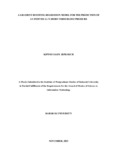A GRADIENT BOOSTING REGRESSION MODEL FOR THE PREDICTION OF AN INDIVIDUAL'S SHORT TERM BLOOD PRESSURE
Abstract
Hypertension is a serious problem across the globe because of its high mortality rate per
year. High Blood Pressure (BP) has no warning signs nor symptoms, and measuring the
BP level is the only way to know about a person's BP status. Many solutions geared
toward managing hypertension have been successful, but the condition still persists
across the globe. Though there is treatment to help those with hypertension manage the
condition, there is a lack of a suitable solution to predict a person's BP based on previous
readings and planned future activities. This study took a different approach to this
problem through the use of Artificial Intelligence (AI), Machine Learning (ML) in
particular. An ML model was used to predict future BP fluctuations of an individual‟s
BP using their future calendar events. The study was done in Uasin-Gishu County,
Kenya.The researcher employed design science and experimental methods for the study.
Rapid Application Development was used in order to design the smartphone application
that captured the data from the individuals. The data for the study was collected using a
smartwatch, which collected the BP and heartrate and a smartphone application which
collected the mood, activities and calendar events of the individuals. The Gradient
Boosting Regression predictive model was implemented using the Iterative and
Incremental Development Model. The Holdout method‟s, test dataset was used along
with R-Squared (R
2
) and Mean Absolute Error (MAE) to evaluate the prototype. The
ML model gave an accuracy score of 99% in predicting an individual‟s BP. The study
also reviled some relationships among the attributes that were used, an example is the
relationship between the individuals‟ activities and their BP. From the findings of the
study, it is recommended that further studies apply these findings to create custom
informative notifications through a phone application, email or Short Message Service
(SMS) for each individual in order to prevent hypertension or even lower BP in case of a
hypertensive patient.

